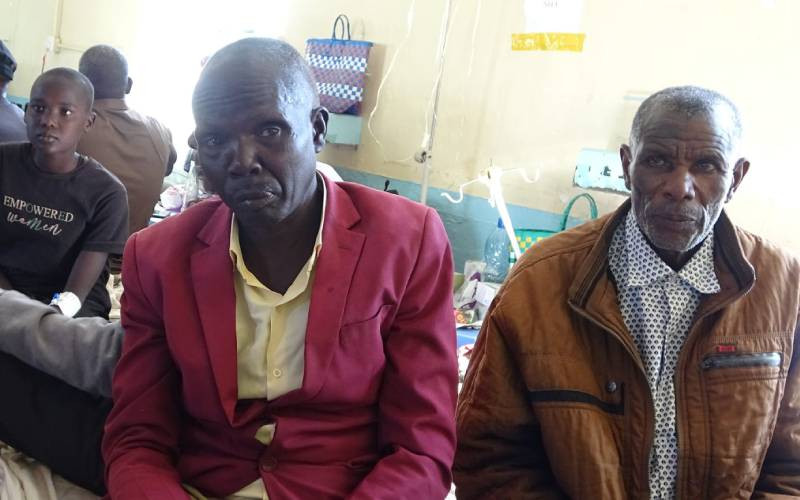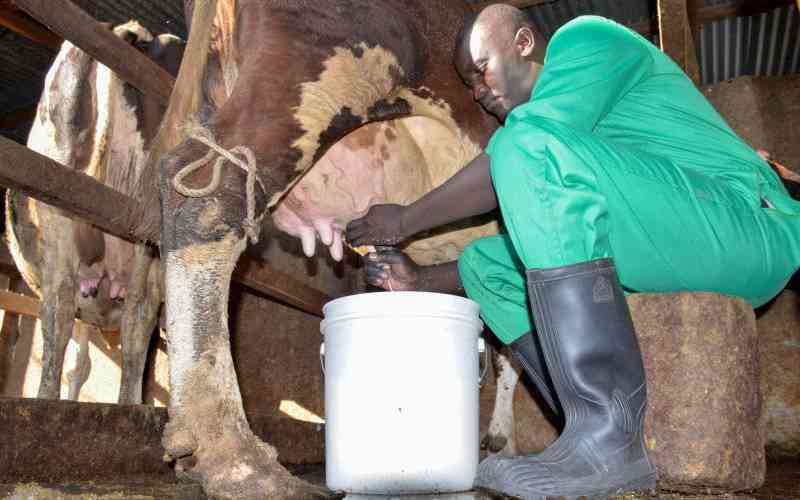When Jonathan Kiptum bought two goats to supplement his family’s milk demand, his neighbours made him a laughing stock. In Anin sub-location, like in the rest of Elgeyo/Marakwet County, residents live on cow milk.
But he shrugged off his neighbours’ mockery and went ahead with his new-found farming venture.
He rears Kenya Alpine goats, a breed, which according to him, thrives in warm and temperate conditions and each produces up to four litres of milk per day.
Soon after starting the rearing, neighbours started flocking his homestead for milk, Mr Kiptum said.
“Villagers soon started coming to my home to find how it tasted. Soon after, they were placing orders,” he said.
The goats are also high breeders. Unlike the usual breeds locals are used to, the Kenya Alpine gave birth in doubles. Kiptum said the villagers began sourcing the milk for their own consumption thus stretching the demand.
Agricultural officials say the new venture is one of the ways of combating food insecurity in the region, as well as, aid in alleviating poverty among the residents through the sale and consumption of milk, which is very nutritious, and other goat products.
“When I saw the demand for the milk had increased in the village, I fully embraced dairy goats farming, which was a new enterprise in the area by increasing the stock,” he said.
Seven years down the line, Kiptum has turned himself into a goat breeder supplying the dairy goats in the North Rift and even to the South Rift regions.
He said people are amazed with the goats, which give birth to a set of twins or even triplets, unlike the local breeds which birth to a single kid.
Currently, Kiptum has three grades of Kenya Alpine goats; pedigree, appendix and intermediate, which retails at different prices. The minimum price for a six-month-old goat ready to be served is Sh15,000.
High end customers
“My recent customer was the Kericho County Deputy Governor Susan Kikwai, who purchased three goats,” said the elated farmer adding that he sells a minimum of six goats per year.
When The Standard on Saturday visited his Chemoi Farm, we found him taking visiting farmers around educating them on how the goats are fed and how to construct the pens.
“My fellow villagers are embracing the venture and currently, we have more than 30 farmers from this sub-location who have abandoned cattle for the goats since their maintenance is minimal in terms of feeds and space required’,” he said.
Stay informed. Subscribe to our newsletter
The goats are kept and fed in small enclosures and require less feed unlike the local breeds that are cumbersome to fend for and end up producing less milk.
Kiptum said the demand for his goats is overwhelming, noting that there was a time he almost sold the entire stock.
“It is interesting because, people even book before the goat gives birth,” he said. And to curb this, he has lined up the customers and restricted the purchase to maximum two goats to enable many people acquire the goats.
Emmanuel Kipkongor, an local resident who has also embraced goat keeping, said he was enthralled by how Kiptum transformed his life with the goats over a short period of time.
“These goats give birth twice a year, and the kids take only six months to be served, provided they are fed well,” he said.
Mr Kipkongor said returns from goats are high compared with that of cattle and even crop farming. “Locally, goat milk retails at up to Sh80 a litre, which is double the price of a cow milk and is determined by supply,” he said.
Keiyo sub-county Livestock Production Officer William Bore, said the Alpine goat is ideal for the local climatic conditions.
“These goats thrive well along the hanging escarpment and the valley because of the prevailing climatic conditions,” he said, adding that they have more than 200 goats within the sub-county.
Mr Bore said the enterprise was a sure way of combating food insecurity in the region because many people cannot afford dairy cows.
 The Standard Group Plc is a
multi-media organization with investments in media platforms spanning newspaper
print operations, television, radio broadcasting, digital and online services. The
Standard Group is recognized as a leading multi-media house in Kenya with a key
influence in matters of national and international interest.
The Standard Group Plc is a
multi-media organization with investments in media platforms spanning newspaper
print operations, television, radio broadcasting, digital and online services. The
Standard Group is recognized as a leading multi-media house in Kenya with a key
influence in matters of national and international interest.
 The Standard Group Plc is a
multi-media organization with investments in media platforms spanning newspaper
print operations, television, radio broadcasting, digital and online services. The
Standard Group is recognized as a leading multi-media house in Kenya with a key
influence in matters of national and international interest.
The Standard Group Plc is a
multi-media organization with investments in media platforms spanning newspaper
print operations, television, radio broadcasting, digital and online services. The
Standard Group is recognized as a leading multi-media house in Kenya with a key
influence in matters of national and international interest.





